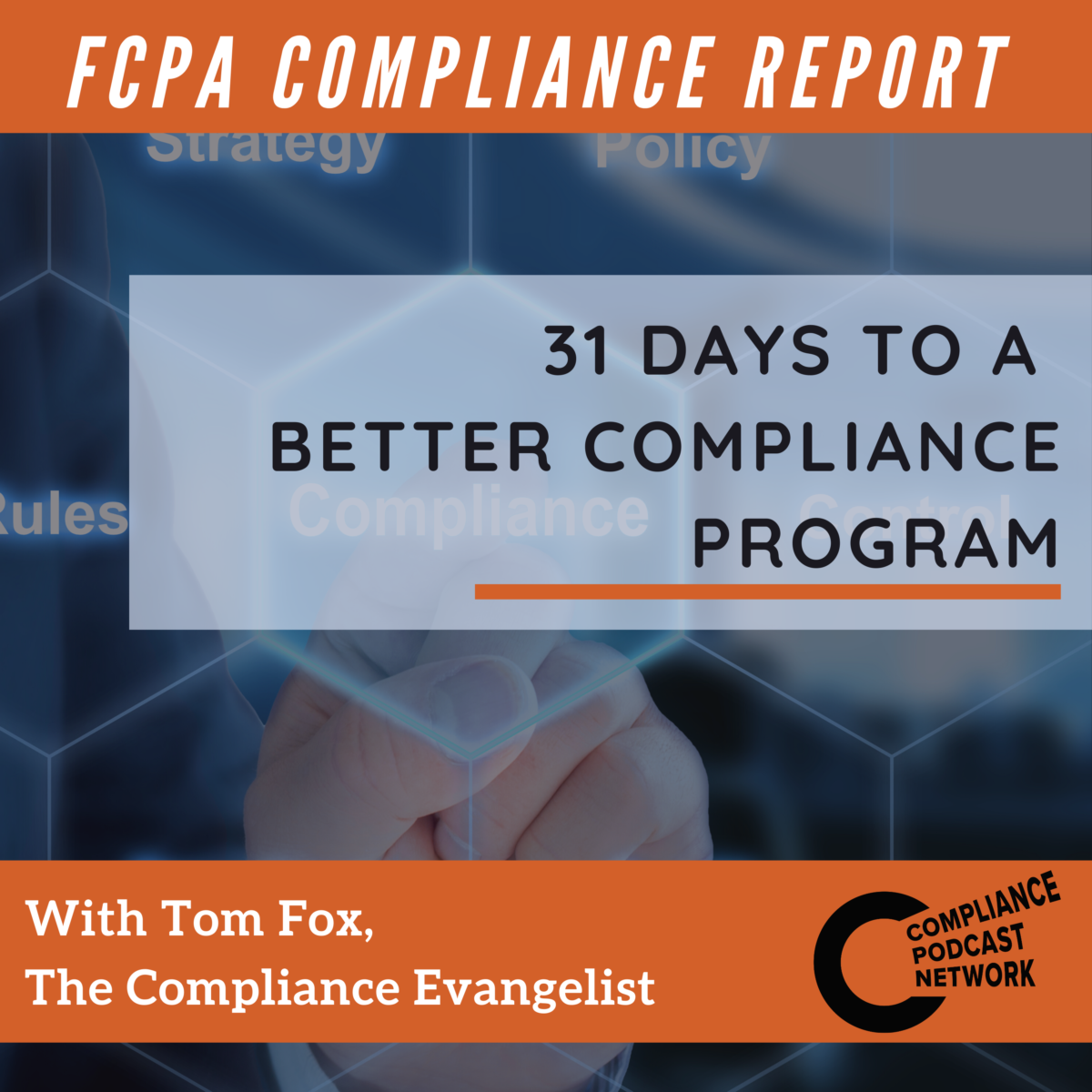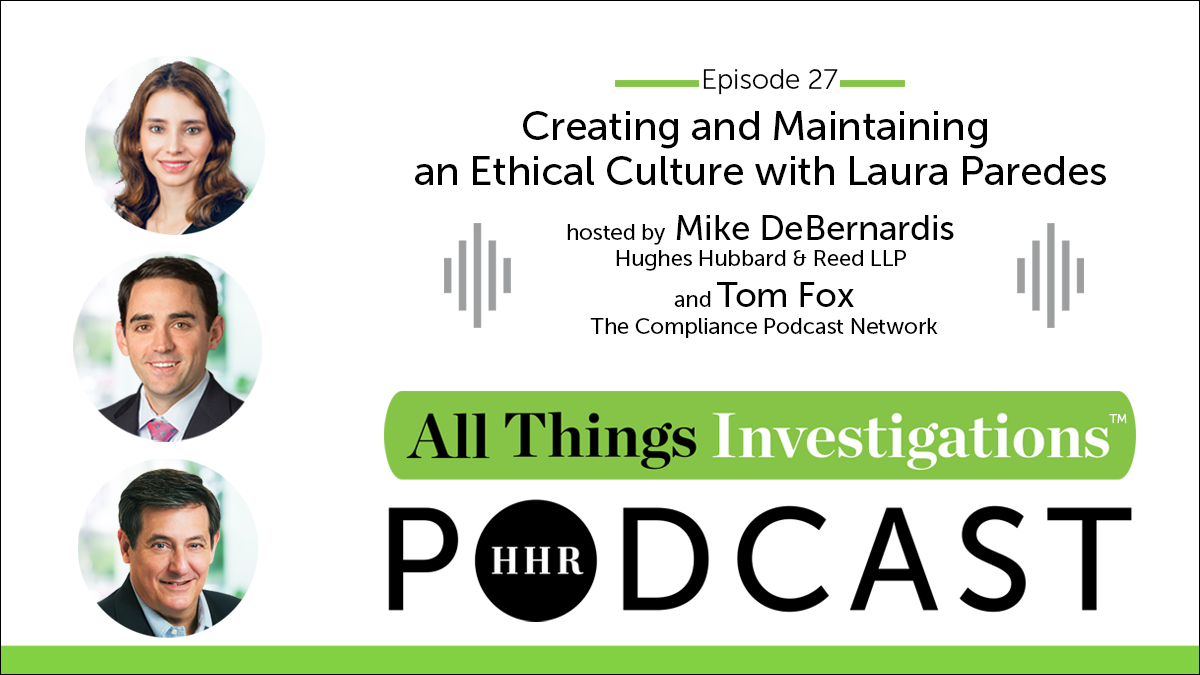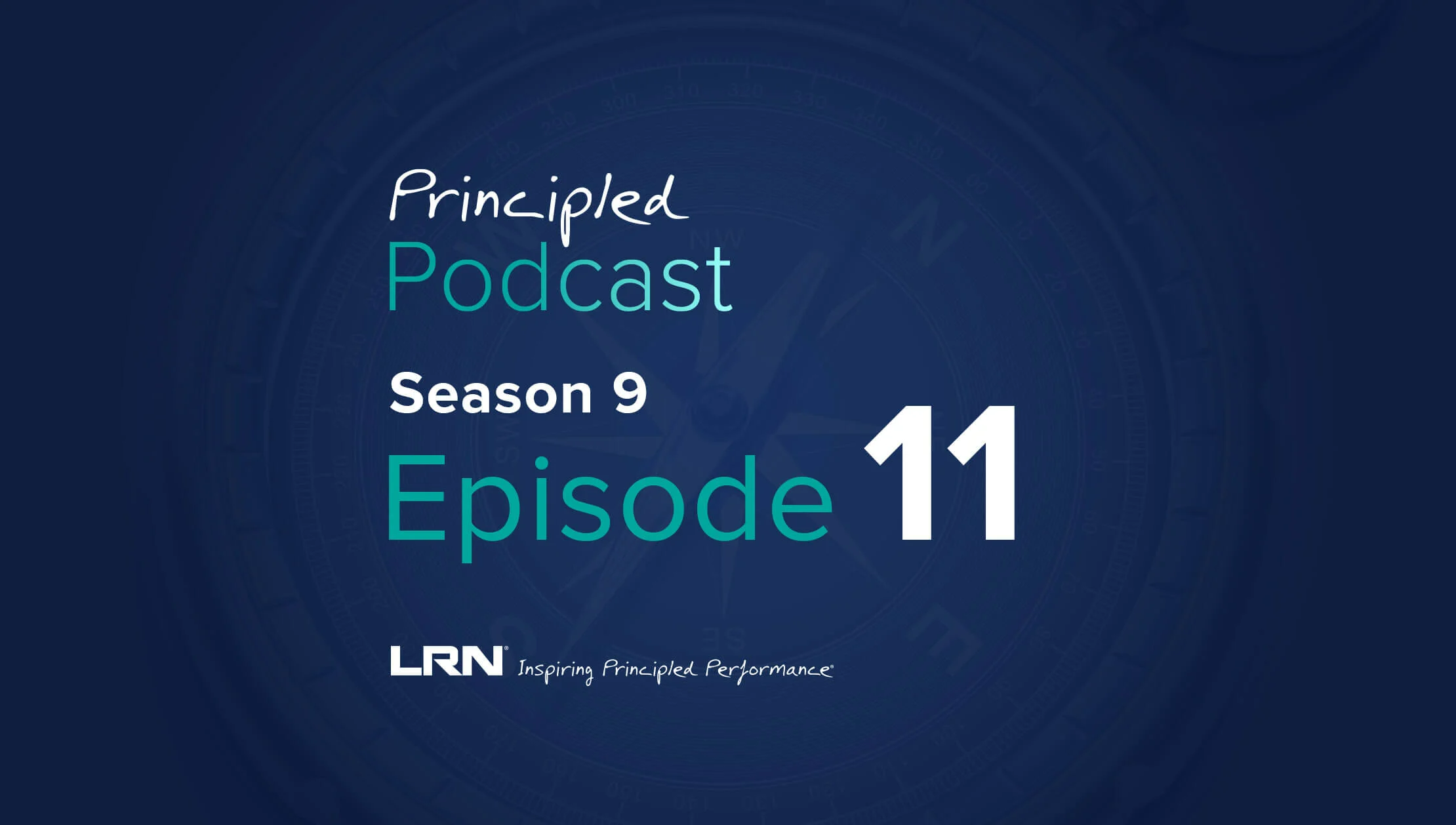Welcome to the Daily Compliance News. Each day, Tom Fox, the Voice of Compliance brings to you compliance-related stories to start your day. Sit back, enjoy a cup of morning coffee, and listen in to the Daily Compliance News. All, from the Compliance Podcast Network. Each day we consider four stories from the business world, compliance, ethics, risk management, leadership, or general interest for the compliance professional.
Tag: culture

Compliance professionals understand the importance of fully operationalizing compliance and embedding it into the fabric of a business. How can your Human Resources (HR) function help to both create and maintain an ethical culture at your organization? It turns out in a variety of ways. Obviously significance of incentives in driving ethical behavior cannot be forsaken but there are other areas to consider such as the impact of cross-cultural differences on ethical behavior. HR can play a role in the importance of creating a speak-up culture where employees feel comfortable reporting ethical concerns without fear of retaliation.
In a world where ethics are paramount, HR professionals hold the key to creating an ethical culture within organizations. But what happens when change is pushed too quickly, compensation drives behavior, and cross-cultural differences come into play? Discover the challenges and secrets to success in this thrilling journey of HR’s quest for an ethical culture…
In the pursuit of understanding the vital role of HR in establishing an ethical culture, I stumbled upon an unexpected revelation that shook the very foundation of my beliefs. It was a twist that challenged my assumptions and left me with a burning question: Can change truly be achieved without sacrificing ethical values? As I ventured deeper into this journey, I uncovered unsettling truths about the underlying ethos of corporations and the detrimental impact of short-term targets. But what I discovered next was even more astonishing, a revelation that would forever alter my perspective on the role of HR in creating an ethical culture…
If you are feeling frustrated and overwhelmed because your efforts to create an ethical culture are being undermined by inconsistent enforcement and lack of accountability, then you are not alone! Despite implementing compliance programs and promoting ethical values, you may find that employees still engage in unethical behavior due to a lack of consequences or clear guidelines. This can lead to a sense of disillusionment and hinder the progress towards an ethical work environment.
HR significantly contributes to embedding ethical behavior within the organizational culture. By creating a conducive environment that promotes honesty and integrity, HR can foster a culture that this significantly resistant to unethical practices. It’s primarily up to HR to ensure that employees feel comfortable voicing concerns without fear of retaliation, helping to enhance the ethical culture within organizations.
The path to cultivating an ethical culture is often met with significant roadblocks such as too much rapid change, reward-driven behaviors, and cross-cultural conflicts. These elements can create an environment where unethical behavior thrives, impacting organizational growth and success. For a moral culture to strive, these challenges should be identified and effectively addressed, paving the way for a workplace that values ethical conduct.
Understanding the underlying organizational dynamics is crucial in establishing and maintaining an ethical culture. It’s not enough just to have a written code of conduct; the actual behaviors within the organization need to be assessed and aligned with these ethical guidelines. HR plays a crucial role in comprehending these dynamics, ensuring that metrics used to reward employees promote ethical conduct rather than encouraging unethical short-term success.
Have you ever heard these myths about the role of HR in creating an ethical culture? First myth: HR is solely responsible for ethical behavior. Second myth: Creating an ethical culture is too time-consuming and costly. Third myth: HR can’t effectively enforce ethical standards. But what if I told you that these myths are far from the truth? Some key points are:
- How HR can be the key instigator in shaping an ethically driven business culture.
- Recognizing the potential roadblocks that could obstruct the path to ethical behavior in organizations and how to overcome them.
- Appreciate the crucial interplay between organizational dynamics and ethics.
- Perceive the nuanced impact of incentives on ethics and how it can steer the moral compass in corporate environments.
- Master the art of endorsing.
My journey into understanding the vital role of human resources in establishing an ethical culture within an organization started with a deep dive into the role of HR and how those roles could that shed light on a fundamental dilemma for compliance. This dilemma was not about right and wrong, but about navigating clashing interests, misaligned incentives, and conflicting cultures. I learned that pushing too much change from the top, too quickly and too frequently can warp a company’s ethical climate. This realization led me to critically analyze the compensation plans in various organizations. The stark reality that people do what they are rewarded to do underlyes ethos of many corporations. This means that short-term targets often overshadowed long-term success, leading to a detrimental impact on the ethical culture. As I delved deeper into the concept of ethical culture, I realized that the essence of this term is far more profound and complex than it seems on the surface. This is not just about formal corporate governance documents or written codes of conduct. It is about understanding and adopting your organization’s underlying culture. It is also about self-awareness, organizational awareness, and the courage to speak up. One problem is that too many leaders tended to seek advice from their like-minded peers rather than embracing diverse opinions. This convinced me about the importance of fostering a speak up culture, and most crucially, a culture devoid of retaliation. This exploration underscored the pivotal role of HR in championing ethical norms, thereby establishing a robust and effective compliance program.

Welcome to the August edition of One Month to a More Effective Compliance Program. In the month of August, 2023 we will consider the role of Human Resources in a best practices compliance program.
Creating an ethical culture in the workplace is essential for any business. Not only does it ensure that employees are making the right decisions, but it also helps to protect the company from potential legal and financial repercussions. But how do you create an ethical environment?
HR can play a key role in this process. They can provide employees with the tools and resources they need to make ethical decisions, such as a personal network for informal guidance and the opportunity to consult with advisory functions. Additionally, HR should support employees who want to do the right thing and ensure that those who speak up are not discriminated against or held back from promotion.
Written protocols are also important for the detection and prevention of unethical behavior. Companies should consider if their compensation system is based on performance or something else, and ensure that incentives are not driving behaviors that are counter to long-term success. Bonus payments and executive share schemes should not be based on short-term business metrics, and cross-cultural differences should be taken into account.
Leadership also plays an important role in creating an ethical culture. Senior leadership should set the tone from the top and reward ethical behavior, while also seeking out diverse opinions and breaking down silos in the corporate organization. Additionally, a speak-up culture should be encouraged to ensure that unethical behavior is not tolerated.
Finally, employees need to understand the organization’s underlying culture in order to make ethical decisions. Companies should ensure that employees have the tools and resources they need to make informed decisions, and that they are not pushed too much change from the top, too quickly and too frequently.
Creating an ethical culture in the workplace is essential for any business. By utilizing HR, written protocols, and leadership, companies can ensure that employees have the tools and resources they need to make ethical decisions. This will help to protect the company from potential legal and financial repercussions, while also creating an environment where employees feel supported and empowered to do the right thing.
Three key takeaways:
- Beware of the three obstacles to creating an ethical culture.
- What really matters in your company?
- A speak up culture will improve the operational performance of your business.
For more information, check out The Compliance Handbook, 4th edition, here.
Welcome to the GalloCast. You have heard of the Manningcast in football. Now we have the Gallocast in compliance. The two top brothers in compliance, Nick and Gio Gallo, come together for a free-form exploration of compliance topics. It is a great insight on compliance brought to you by the co-CEOs of ComplianceLine. Fun, witty, and insightful with a dash of the two brothers throughout. It’s like listening to the Brothers Gallo talk compliance at the Sunday dinner table. Hosted by Tom Fox, the Voice of Compliance.
This podcast episode focuses on the importance of proper oversight and diligence when it comes to CCOs and other corporate leaders. The discussion highlights the implications of the Supreme Court’s ruling on diversity hiring, the need for internal controls implementation, the potential of ESG investment ROI, the consequences of unethical behavior, and the need for Deutsche Bank to address its culture of ethics. This episode emphasizes the need to create a culture of compliance and oversight within organizations in order to protect against fraud and mismanagement.to navigate these challenging issues in the corporate world. Tune in to GalloCast now!
Key Highlights
- FTX CCO charged
- Diversity after Supreme Court. Is it still important?
- At what level should you apply DD to new hires? Executive level or something else
- ESG-positive or negative for shareholders
- BOA follows Wells Fargo with a fake accounts scandal.
- KPMG caught cheating in The Netherlands
- Deutsche Bank fails to meet DPA requirements.
Resources
Nick Gallo on LinkedIn
Gio Gallo on LinkedIn
Tom Fox
Connect with me on the following sites:

Welcome to the award-winning FCPA Compliance Report, the longest-running podcast in compliance. In the latest episode of FCPA Compliance Report, Tom Fox speaks with Parijat Jauhari and Susan Divers, both with LRN, about their new tool, Catalyst Reveal, which helps compliance professionals deal with the new DOJ requirements around culture assessment, risk management, monitoring, and improvement. They explain how Catalyst Reveal goes beyond traditional methods of measuring the effectiveness of compliance training and that the platform includes completion data, culture data, and learner sentiment analysis to determine training effectiveness.
They also discuss the importance of benchmarking, which allows for easy comparison of clients within the same industry and revenue band. Plus, find out about their upcoming additions to their product and how they can provide solutions to challenges posed by the Department of Justice. Tune in now to discover how Catalyst Reveal can help compliance professionals fulfill their obligations under the 2023 Evaluation of Corporate Compliance Programs.
Key Highlights
· Measuring Ethical Culture
· Enhancing Compliance Training Effectiveness
· Challenges in measuring training impact
· Data Analytics in Compliance Training
· Benchmarking and Data-driven compliance training
Notable Quotes
“This is the most exciting development in this space in all the time that I’ve been working in ethics and compliance because it allows companies and chief ethics and compliance officers and their teams to move beyond what I would call dead data.”
“The culture pulse survey that we’ve included in this which is the ethical culture pulse survey. That’s its full title. It asks questions in real time about levels of engagement from the employee base and levels of respect levels of transparency, levels of organizational justice. And that that is a breakthrough.”
“What this tells you is it goes beyond we had a warm seat. for this training to say, we had people take it, and a lot of people in this group really struggled with facilitation payments or with what is an actual conflict of interest. And this is an area that compliance officers really struggle with.”
“We are really using some new technology, machine learning to mine the data because it’s you’re accumulating it every day that employees are actually.”
Resources
Parijat Jauhari on LinkedIn
Susan Divers on LinkedIn
Tom Fox
GalloCast – Episode 9, Live at ECI
Welcome to the GalloCast. You have heard of the Manningcast in football. Now we have the GalloCast in compliance. The two top brothers in compliance, Nick and Gio Gallo, come together for a free-form exploration of compliance topics. It is a great insight into compliance brought to you by the co-CEOs of Ethico. Fun, witty, and insightful with a dash of the two brothers throughout. It’s like listening to the Brothers Gallo talk compliance at the Sunday dinner table. Hosted by Tom Fox, the Voice of Compliance.
In this episode of the GalloCast, the trio discusses some of the most challenging issues companies face regarding ethics and compliance. They start by diving into the recent $767 million fine slapped on British American Tobacco for colluding to sell cigarettes into North Korea, violating sanctions. They debate who should be held accountable for changing a company’s culture, how deep-rooted biases can affect decision-making, and the effectiveness of regulatory enforcement. The discussion covers the intricacies of ethics in different business models, including distributor and commissioned sales agent models. They also discuss the risks and benefits of a conservative approach and the adaptability of ethics and compliance programs. The episode concludes by discussing cultural fit in mergers or acquisitions and how finding common ground and preserving distinctness can be accomplished. Don’t miss out on the wealth of insights and practical advice on navigating these challenging issues in the corporate world. Tune in to GalloCast now!
Key Highlights:
- BAT’s illegal sales to North Korea
- Determining Right and Wrong in Corporate Decisions
- Balancing Values and Profit in Business
- Balancing Compliance and Ethics Programs
- Adapting Ethics & Compliance Programs
- Ethics and Compliance Teams in Companies
- Dangers of Groupthink in Decision-Making
- Culture’s Role in Business Mergers and Acquisitions
- Cultural Integration in Mergers & Acquisitions
Resources
Nick Gallo on LinkedIn
Gio Gallo on LinkedIn
Tom Fox
Connect with me on the following sites:

One of the more difficult things to predict in the mergers and acquisition context is how the cultures of the two entities will merge. Further, while many mergers claim to be a ‘merger of equals’ the reality is far different as there is always one corporate winner that continues to exist and one corporate loser that simply ceases to exist. This is true across industries and countries; witness the debacle of Daimler Chrysler, the disaster of the HP acquisition of Autonomy, or the slow downhill slide of United Airlines, Inc. after its merger with Continental Airlines.
In the compliance space this clash of cultures is often seen. One company may have a robust compliance program, with a commitment from top management to have a best practices compliance program. The other company may put profits before compliance. Whichever company comes out the winner in the merger, it can certainly mean not only conflict but if the winning entity is not seen as valuing compliance, it may mean investigations and possibly even violations going forward.
Learning how your employees in other countries will approach decision-making and leadership will give you, as the CCO, insight into how they will approach compliance. It will require you to get out into the field to talk with folks. If your company grows organically or through M&A or the JV route, it will need to understand how your new employees will not only think through issues but how they will relate to instructions from the home office in America.
Three key takeaways:
- Culture clash through a merger can be extremely negative for a company.
- What are the cultures of leadership in your organization?
- Learning how your employees approach decision making can provide insight into how the will approach compliance.

Ethical misconduct can destroy a company’s reputation, result in fines and legal action, and erode trust with stakeholders. However, building an ethical culture is not easy, and compliance officers face many challenges in doing so. Ethical culture is not just about having a set of guidelines or policies in place, but rather, it’s about employees having strong values and principles that guide their decisions, even when no one is looking. In this episode of All Things Investigations, compliance expert Laura Paredes joins hosts Tom Fox and Mike DeBernardis to discuss what ethical culture means, how to achieve it, and signs that a company does or does not have an ethical culture.
Laura Paredes is the Compliance Director for the Americas at Ingram Micro, a Fortune 100 company and global technology distributor. She is a compliance expert with over 15 years of experience in the field, focusing on anti-corruption, anti-bribery, and antitrust compliance. Prior to her current role, Laura worked as a compliance attorney and auditor for leading multinational corporations. She has a law degree from Universidad de Buenos Aires and an LLM in International Business and Economic Law from Georgetown University.
You’ll hear Tom, Mike and Laura discuss:
- An ethical culture is about employees having strong values and principles that guide their decisions, even when no one is looking.
- An ethical culture is part of a company’s DNA and should allow employees to make the right decision, even if the rule is not written anywhere.
- Signs that a company has an ethical culture include:
- Positive peer pressure, where employees feel free to speak up and raise concerns without fear of retaliation.
- Leadership plays a crucial role in creating and maintaining an ethical culture by communicating the values of the company and reinforcing them through middle management.
- Transparency and an open-door policy.
- Signs that a company does not have an ethical culture include employees being afraid to speak up, wrongdoing being allowed, and lack of accountability.
- An ethical culture is led by committed leadership and requires institutional justice and fairness.
- Establishing policies and procedures that are relevant and easy to understand is key, along with constant training and communication to employees.
- Recognizing and rewarding good conduct can have a positive effect on the culture.
- It’s important to have a plan for building an ethical culture and to have leadership and the Board of Directors on board with it.
- Building alliances and working with other departments, such as audit and finance, can be effective in promoting compliance.
KEY QUOTES:
“An ethical culture is about employees having strong values, strong principles that they can apply when they’re going to make a business decision. It’s something that is part of the DNA of the company, and it’s something that will allow them to make the right decision even if the rule is not written anywhere.” – Laura Paredes
“When employees are not afraid to speak up, and they will openly bring concerns up to their managers or to a compliance officer or legal. They will feel free to ask questions they will not feel ashamed of… There is transparency and there is an open door policy and people feel free to speak up without fear of retaliation, that’s a good sign.” – Laura Paredes
“If you can work with an audit, if you can work with finance and share the same tools that they’re using to implement the compliance program, to communicate, to create a culture of compliance, then maybe you can reach more people and you can be more effective.” – Laura Paredes
Resources:
Hughes Hubbard & Reed website
Laura Paredes on LinkedIn
 What you’ll learn on this podcast episode
What you’ll learn on this podcast episode
Rewards and recognition are key tools for building an ethical workplace culture. Leveraging these creates a positive feedback loop and reinforces stated goals and standards. But what does successfully engaging employees through rewards and recognition structures look like in practice? How can these efforts catalyze values in action? In this episode of the Principled Podcast, Dr. Arieana Thompson, ethical culture advisor at LRN, discusses rewards and recognition structures with Alyssa Menard-Szacilo, a global strategic customer success manager at Alteryx. Listen in as the two explore how effective rewards and recognition structures foster ethical culture and inspire values-aligned behaviors in the workplace.
Guest: Alyssa Menard-Szacilo
Alyssa Menard-Szacilo is an accomplished global customer success manager at Alteryx with extensive experience in data analytics and customer experience. She holds a master’s degree in sociology from the University of Colorado and a bachelor’s degree in psychology and criminal justice from Norwich University.
Alyssa has played a key role in driving customer engagement and delivering measurable value to clients. She is committed to helping others succeed and is highly regarded by her colleagues and peers. In the last year Alyssa has received the Rookie of the Quarter and the Global Newcomer of the Year awards.
Overall, Alyssa is a highly skilled and dedicated global customer success manager, committed to delivering exceptional results for clients and helping organizations achieve their goals. She brings a unique combination of expertise, experience, and passion to every project she undertakes, making her a valuable asset to her clients.
Dr. Arieana Thompson believes in positively transforming the modern-day workplace through thought-provoking, evidence-based insights.
Arieana is a subject matter expert in executive leadership, succession management, ethics and compliance (E&C), wellness cultures, and employee growth. Arieana has experience advising in internal and external settings and professional speaking. Arieana is a Certified Positive Intelligence Coach (CPQC), helping leaders and individuals to cultivate self-awareness, harness natural strengths, and reduce stress.
As a scientist-practitioner, Arieana researches and publishes well-being, culture, and leadership thought pieces in industry and peer-reviewed academic journals. These publications enable executives to create and sustain values-led, profitable, and creative companies.
Where does creativity fit into compliance? In more places than you think. Problem-solving, accountability, communication, and connection – they all take creativity. Join Tom Fox and Ronnie Feldman on Creativity and Compliance, part of the award-winning Compliance Podcast Network.
Ronnie’s company, Learnings and Entertainment, utilizes the entertainment devices that people use to consume information in their everyday, non-work lives, and apply it to important topics around compliance and ethics. It is not only about being funny. It is about changing the tone of your compliance communications and messaging to make your compliance program, policies and resources more accessible.
Get ready to tap into the minds of compliance gurus, Tom Fox and Ronnie Feldman, as they dive into how corporate culture impacts compliance. In today’s world, corporate culture is a key element of a best practice compliance program. However, many companies still focus on monitoring, risk assessment, policies, and procedures. Ronnie argues that the main goal of compliance is to stop people from doing bad things and to live up to company values. Discover how to create psychologically safe environments, train leaders to build trust, and use interesting and informative content to make your communication and training more engaging. Learn how middle management can work with compliance to build trust, regain institutional fairness for employees who speak up, and undo the lack of integrity observed in many organizations. Creativity and Compliance invites you to reach out for more information about the philosophy behind their solutions. Listen to the podcast today to take the first step towards a culture of compliance!
Key Highlights
· The Importance of Corporate Culture in Compliance Programs
· Addressing social and leadership environments in organizations
· Promoting Integrity and Institutional Trust
· Engaging Compliance Training Techniques
Key Quote
“We’re trying to stop people from doing bad things or said in a positive way. We’re trying to help We want our employees to live up to our values. Right?”
Resources:
Ronnie
- Ronnie Feldman (LinkedIn)
- Learnings & Entertainments (LinkedIn)
- Ronnie Feldman (Twitter)
- Learnings & Entertainments (Website)
- Compliance Confessions – inspired by “Mean Tweets” these 90-second commercials address misconceptions and excuses to promote speak up culture and the E&C team as positive and helpful.
- E&C Training Jams – a soulful singer banters with ethics & compliance explaining policies, sharing examples and debunking excuses.
- Tales from the Hotline – Real speak up-themed stories about workplace behavior gone wrong.
- Workplace Tonight Show! – E&C meets SNL Weekend Update explaining corporate risk topics and why employees should care.
- 60-Second Communication & Awareness Shorts – A variety of short, customizable, music and multimedia, quick-hitter “commercials” promoting integrity, compliance, speaking up and the E&C team as helpful advisors and coaches.
- Custom Live & Digital Programing – Custom creative programming that balances the seriousness of the subject matter with a more engaging delivery. After all, you can’t bore people into learning.
Tom







